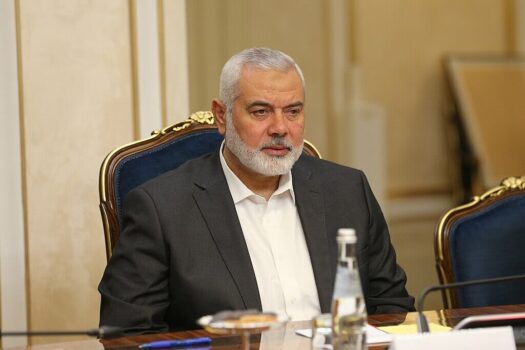 Hamas’ top political leader was killed early Wednesday by a predawn airstrike in Tehran, Iran, sparking accusations from Iran and the militant group that Israel was behind the assassination. This development risks escalating into a full-scale regional war, with Iran’s supreme leader vowing revenge.
Hamas’ top political leader was killed early Wednesday by a predawn airstrike in Tehran, Iran, sparking accusations from Iran and the militant group that Israel was behind the assassination. This development risks escalating into a full-scale regional war, with Iran’s supreme leader vowing revenge.
Iran’s Supreme Leader Ayatollah Ali Khamenei issued a statement on his official website, calling for revenge against Israel, stating that the assassination had prepared “a harsh punishment for itself” by killing “a dear guest in our home.”
Israeli Prime Minister Benjamin Netanyahu responded by warning that Israel “will exact a very heavy price from any aggression against us on any front,” though he did not specifically mention the killing. “There are challenging days ahead,” he added.
The assassination occurred just hours after Ismail Haniyeh, Hamas’ political leader, attended the inauguration of Iran’s new president in Tehran. This strike follows Israel’s pledge to target Haniyeh and other Hamas leaders in retaliation for the group’s October 7 attack on southern Israel, which ignited the ongoing conflict in Gaza. The timing of the strike is particularly significant, as it came shortly after Israel targeted a top Hezbollah commander in Beirut.
The killing has heightened the risk of direct confrontation between Israel and Iran, a scenario that could potentially draw the entire region into conflict. The United States and other nations are urgently seeking to prevent a wider, deadlier war.
The assassination also threatens to derail negotiations for a cease-fire and hostage release deal in Gaza, which U.S. mediators had indicated were progressing. Additionally, it could exacerbate tensions between Israel and Hezbollah, especially after a recent rocket attack in the Israeli-controlled Golan Heights killed 12 people.
In response to that attack, Israel carried out a rare strike in Beirut on Tuesday evening, killing Fouad Shukur, a top Hezbollah commander. The Lebanese Health Ministry reported that the strike also killed three women and two children.
White House national security spokesman John Kirby commented on the situation, stating that there was “no sign that an escalation is imminent” in the Middle East and that a cease-fire agreement for Gaza remained possible. He also noted that the U.S. could not independently confirm the reports from Tehran and did not speculate on the impact of Haniyeh’s killing on the cease-fire efforts.
U.S. Secretary of State Antony Blinken clarified that the United States was not aware of or involved in the assassination, emphasizing that this is “something we were not aware of or involved in.” Speaking to Channel News Asia, Blinken refrained from speculating about the assassination’s impact on cease-fire negotiations.

ICC Issues Arrest Warrants For Netanyahu, Gallant And Al-Masri
Russia Fires Intercontinental Missile In Ukraine Attack — Kyiv
South African Police Raid Warehouses Amid Food Poisoning Deaths
Russian Missile Strike Kills Eight, Wounds 39 In Ukraine’s Odesa Region